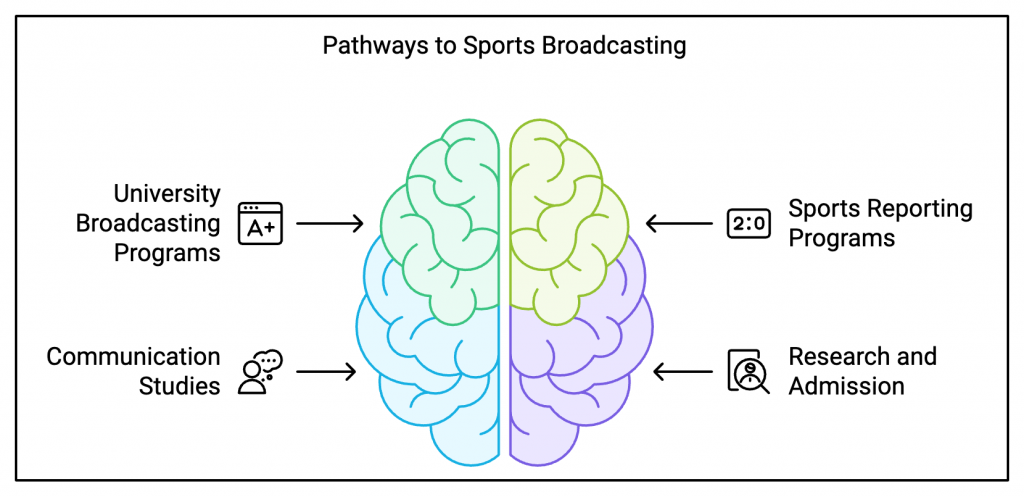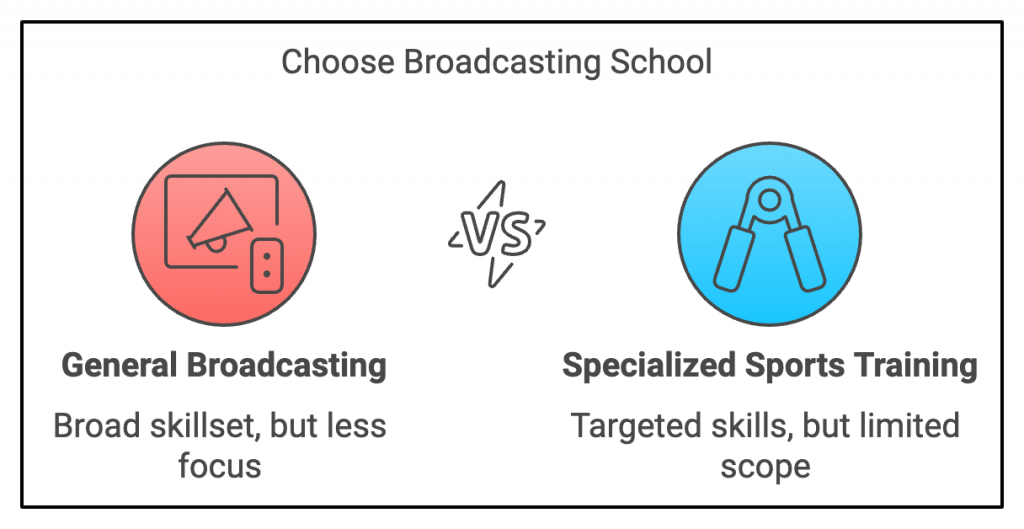8 Steps for How to Become a Sports Broadcaster
Sports broadcasting is, of course, a pretty charming, exotic sort of job. Well, so it seems. Embarking on a career in sports broadcasting can seem exciting, but it requires both skill and dedication.
What is Sports Broadcasting?
Sports broadcasting is the live coverage of sporting events on TV, radio, or online platforms. It combines play-by-play commentary with expert analysis, bringing the action and insights of a game to fans who aren’t there in person.
Top-level broadcasters for any sport are nothing less than celebrities. They are cheered by fans in the stands as they enter the broadcasting booth, waving back to the crowd, as the camera takes them into focus.
Take Jack Buck from baseball or King Booker-T from wrestling entertainment, for example. These individuals didn’t just land their jobs overnight. Building a successful sports broadcasting career takes time, experience, and, most importantly, a deep understanding of the sport they cover.
People love to follow their favorite broadcasters. Some fans cling to their favorite sportscaster’s opinions and match predictions as if they were the word of God.
These “sidelines” stars go places at their channels’ expense. They frequently receive business-class air tickets and free stays at luxury hotels.
According to Zippia, an average sports broadcaster makes around $47,000 a year. Plus, consider the fame and sweet perks on top of that.
No doubt, being a sports commentator sounds like a super exciting career! So, below, let’s find out how YOU can get into this profession and land a dream job in it.
All set? Let’s dive in!
Gain Broadcasting Experience In College
High school or college can be a stepping stone where you can gain lots of sports broadcasting experience early on.

Most schools, generally, have teams for one or more popular country sports like rugby or baseball. Those teams compete with other schools in local competitions occasionally, making some news.
You can seize the opportunity and take the first step by volunteering to broadcast on behalf of your school. This is an ideal way to gain early experience and start collecting valuable sports broadcasting career information, which will be crucial as you move forward.
By announcing and reporting for your school team you will gain invaluable knowledge, experience, and, above all, self-confidence. And, all of that will provide you with a solid foundation for your future.
Moreover, many US schools have sports clubs that publish papers or weekly magazines. If your school has them too, you could contribute by writing blogs and informative pieces for them. Writing sports broadcasting articles can also be an excellent way to sharpen your reporting skills and build a portfolio that showcases your expertise.
That’ll add further meat to your resume and be of tremendous help when you’re out into the professional world after school.
Get a Bachelor’s Degree In Sports Journalism
If you had no luck with school, no worries… You can still choose to become a sports broadcaster by enrolling in any state university offering a degree in broadcasting.
Basically, for the most part broadcast journalism wasn’t a major in formal education (sports journalism wasn’t even a thing!) in the US. There was just the plain, old umbrella term ‘communication studies’.
Under that umbrella, they taught lumped in several subjects like broadcasting, TV hosting, media ethics, sociology, etc.
But, thanks to the awareness that media has created, many well-known universities now offer degrees with a specific focus on broadcasting.
Some have even introduced exclusive sports reporting programs.
You may go to the nearest university teaching a broadcasting program, do some necessary research as well as questioning and get admission ASAP.

Attend a Broadcasting School
Broadcasting schools are like universities (but not universities) and they offer specialized courses to those looking to get a breakthrough into any sort of media reporting. Some broadcasting schools even offer summer programs, like sports broadcasting summer camps, where students can gain hands-on experience in live reporting and commentary.
The overall cost will usually be $10,000 or more.
To name a few US broadcasting schools, Columbia School of Broadcasting, Carolina School of Broadcasting, Connecticut School of… are doing a fabulous job.
However, the drawback for these schools is that they teach general broadcasting, including things you may not be interested in at all like radio, DJ music, weather broadcasting, etc.
And, to your dismay, sports may only be a tiny part of the entire course.

Another thing to note is that these schools usually teach the theory, the hands-on experience of sports broadcasting is yet to be gained.
That means you’ll, probably, still have to struggle hard to get into the real sports world once your classes are done.
However, if the school promises your placement at a reputable channel or sports firm after the program finishes, it may not be a bad option after all.
Sports Broadcasting Summer Camp
For those looking to gain hands-on experience early in their sports broadcasting journey, attending a sports broadcasting summer camp can be a fantastic opportunity. These camps are designed to provide participants with real-world training, allowing them to practice play-by-play commentary, work with professional equipment, and learn from seasoned broadcasters.
Look for Internship Opportunities
With, or without, a degree in communications or journalism, you could start looking for opportunities at sports channels.
The most sought-after thing for a commentator in any sport is not a degree (although that’s of great value), it’s their knowledge of that sport – particularly, in this era, where live skills matter more than lifeless paper degrees.
You could begin dropping your resume at the sports broadcasters in your town. Or, if you are ready to move, mail your credentials to every sports channel in the state.
Assuming all odds against you, you should still hear back from 5%, at least.
Now, whatever openings they say are available (freelance writer, reporter, assistant) weigh them up and go for the best.
Believe in yourself, and don’t let the opportunity pass. You need to get a foot in the door and any position will work for you.
Once you are hired as an intern, you should start building your network and look for chances to jump up.
Become Assistant to a Known Sportscaster
This option could be your sure bet to enter the space and begin your dream job as a sports broadcaster, reporting or talking about your favorite game.
But this is not so easy. It’ll need proper planning.
The idea is that you get under the wings of a sportscaster that’s well-established and has leverage in the industry.
You must be thinking how, right?
Well, first of all, choose a sport that you love from the bottom of your heart and about which you know more than anything else. Let’s say, that’s wrestling.
Now, pull several wrestling broadcasters and decide who you’d like to work most for.
Let’s say that’s Jerry Lawler. Now, pull down as much info about him as you can and write a killer letter to him asking him to be your mentor and offering him your services.
99% of the time, you’ll get a response, if the quality of your letter is good enough.
If the response is negative find another commentator and repeat the process. If it’s positive, well, get started!
Start Sports Commentary On YouTube
If you are great at talking about sports and can’t wait for that stroke of luck that will place you as a broadcaster at some sports club, start your YouTube channel now!
Thankfully, this century has been wonderful in terms of tech development. Google, YouTube, Facebook, Instagram… The world has totally transformed – and to the benefit of those looking to get a break into their dream space.
You don’t need permission or assistance from any TV station, sports channel, or broadcaster.
All you need is access to a reliable computer system as well as a good internet connection and you can create your online sports channel in no time.
If you know a great deal about a sport, and you can make solid predictions on it, odds are that you’ll begin to gain an audience pretty quick.
And, with some internet marketing, live streaming and fan interactions, you could be a BIG hit!
Here are some famous YouTube sports commentators to inspire you: Chris Smoove, Coach Daniel, Professor Live, etc.
Expand and Leverage Your Network
Networking is super important! In many cases, careers in sports broadcasting are made or broken by the connections you build in the industry.
Bear in mind, whatever route you take, networking will be a MUST have weapon in your arsenal.
So, along with pro communication, reporting know-how and, sometimes writing skills, you will need to be a smart networker – someone for whom rapport-building is easy-peasy.

Because, truth is, if you think only a university degree or diploma is sufficient to get you somewhere in this business, you are mistaken.
Expert networking skills will enable you to make the necessary connections you’ll need to get to the top. If you’re working behind the scenes – to get on the air!
To hone your networking you can consider investing in a seminar if you can find one in your city. Or, if there are none, start reading books on networking.
Also, NLP training workshops are one of the best when it comes to improving your communication skills. See where they are happening near you and book your spot quickly.
All in all, get focused on improving and gaining mastery over your networking skills. It will do you wonders.
Seek Help Of a Placement Agency
If you are willing to spend some bucks. If you see no hope with your own efforts. You could go straight to a placement agency and seek their help in getting a broadcasting role at a sports channel.
Well, frankly speaking, they are a short-cut. But they do work!
There are plenty of placement agencies in the United States and engaging one means something will definitely come out for you.
Another advantage of using an agency can be that they will not put you in any organization just randomly, but they’ll only present you with jobs relevant to you, matching with your skills.
Also, think it this way: the jobs in the space are NOT going to go over the top any time soon, at least you can’t expect anything like that in the next 6 years.
Because a recent report from the Bureau of Labor Statistics showed the broadcasting job market will only grow by 1% by 2028.
So, job placement services may actually be a real help, considering the cutthroat competition.
Careers in Sports Broadcasting
A career in sports broadcasting can take many forms, depending on your interests and skills. While play-by-play commentary is one of the most visible roles, there are several other career paths to consider.
No matter the path you choose, each role in sports broadcasting offers exciting challenges and opportunities for growth, allowing you to specialize in the aspects of the profession that most appeal to you.
How to Get Into Sports Broadcasting
Getting into sports broadcasting involves a combination of education, experience, and networking. Whether you start by volunteering in school, attending specialized programs, or starting your own sports commentary platform online, the path to becoming a sports broadcaster requires persistence.
- Gain experience early. Volunteer to broadcast school or local sports events. This provides a valuable opportunity to develop skills and gain insight into the profession.
- Pursue formal education. A degree in broadcasting or communications can help you build a solid foundation and open doors to future opportunities.
- Take advantage of internships. Many sports networks and radio stations offer internships that allow you to gain practical, hands-on experience.
- Network actively. Building relationships with professionals in the field can lead to future job opportunities. Attend seminars, join clubs, and engage with broadcasting communities online.
By following these steps, you can steadily build a career in sports broadcasting and make your way into the industry.
Takeaway
Alright, you’ve had a good look over the routes you can take to end up as a sports broadcaster, speaking to throngs of enthusiastic fans about your beloved game (whichever it is!).
Since the job is a coveted one, there will be a dozen others like you in the race.
But, more than running faster, you’ll need to run smarter!
That means you’ll need to make a proper strategy, a roadmap with a definite goal and then move step-by-step towards that goal.
With the right moves, swift mind and perseverance, you’ll soon see the light (your personal broadcasting booth) at the end of the tunnel. You’ll reach your destination.



